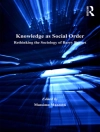Low fertility in Europe has given rise to the notion of a ‘fertility crisis’. This book shifts the attention from fertility decline to why people do have children, asking what children mean to them. It investigates what role children play in how young adults plan their lives, and why and how young adults make the choices they do. The book aims to expand our comprehension of the complex structures and cultures that influence reproductive choice, and explores three key aspects of fertility choices: the processes towards having (or not having) children, and how they are underpinned by negotiations and ambivalences how family policies, labour markets and personal relations interact in young adults’ fertility choices social differentiation in fertility choice: how fertility rationales and reasoning may differ among women and men, and across social classes Based on empirical studies from six nations – France, Scandinavia, Denmark, Norway, Sweden, Germany and Italy (representing the high and low end of European variation in fertility rates) – the book shows how different economic, political and cultural contexts interact in young adults’ fertility rationales. It will be of interest to students and scholars of sociology, anthropology, demography and gender studies.
Anne Lise Ellingsaeter & An-Magritt Jensen
Social Meaning of Children and Fertility Change in Europe [PDF ebook]
Social Meaning of Children and Fertility Change in Europe [PDF ebook]
Achetez cet ebook et obtenez-en 1 de plus GRATUITEMENT !
Langue Anglais ● Format PDF ● Pages 200 ● ISBN 9781135092146 ● Éditeur Anne Lise Ellingsaeter & An-Magritt Jensen ● Maison d’édition Taylor and Francis ● Publié 2013 ● Téléchargeable 6 fois ● Devise EUR ● ID 2647704 ● Protection contre la copie Adobe DRM
Nécessite un lecteur de livre électronique compatible DRM












